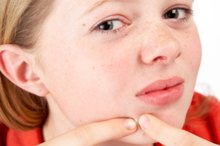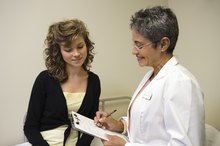What does fact checked mean?
At Healthfully, we strive to deliver objective content that is accurate and up-to-date. Our team periodically reviews articles in order to ensure content quality. The sources cited below consist of evidence from peer-reviewed journals, prominent medical organizations, academic associations, and government data.
- Linus Pauling Institute; Folic Acid; Jane Higdon; 2007.
- Pubmed Health: Rosacea
- Pubmed Health: Rosacea
The information contained on this site is for informational purposes only, and should not be used as a substitute for the advice of a professional health care provider. Please check with the appropriate physician regarding health questions and concerns. Although we strive to deliver accurate and up-to-date information, no guarantee to that effect is made.
Folic Acid & Acne Rosacea
Vitamins play an important role in maintaining the health of all of the tissues in your body, including your skin. Folic acid is a B vitamin, and some experts recommend using it to treat skin conditions such as acne rosacea 2. However, oral folic acid supplementation may interfere with creams used to treat acne rosacea, so talk to your doctor before taking folic acid supplements 2.
Folic Acid
Folic acid, sometimes referred to as folate, is a B vitamin. Folic acid is particularly important for allowing the body to transfer chemical structures, a process that is necessary in making new DNA and in breaking down amino acids. One of the main symptoms of a folic acid deficiency is anemia because the body has trouble making new cells, including red blood cells. Folic acid can be found in supplements, fortified foods and green leafy vegetables.
- Folic acid, sometimes referred to as folate, is a B vitamin.
- Folic acid is particularly important for allowing the body to transfer chemical structures, a process that is necessary in making new DNA and in breaking down amino acids.
Acne Rosacea
Probiotics for Rosacea
Learn More
Acne rosacea, sometimes just called rosacea, is skin problem that causes inflammation of your eyelids, chin, forehead, cheeks and nose 2.cause:
- Acne rosacea
- sometimes just called rosacea
- is skin problem that causes inflammation of your eyelids
- chin
- forehead
- cheeks
- nose 2
Symptoms of rosacea include acne like skin eruptions, an increased tendency to blush or flush, the appearance of many small spider-like blood vessels, also known as telangiectasia and a red or bulbous nose 2. Patients with acne rosacea may also have a chronically red face and chronically red eyes 2.
Folic Acid and Rosacea
Supplements that contain the B complex of vitamins are sometimes used to treat skin problems. One website that specializes in alternative medicine recommends treating cases of rosacea with daily usage of a B vitamin supplement that contains at least 400 mcg of folic acid 2. However, at the time of publication, there are no studies in humans that have examined the effects of folic acid supplementation in humans, so it is impossible to determine if this treatment is beneficial.
Considerations
Common Skin Rashes on the Face
Learn More
Taking folic acid supplements may actually interfere with some treatments for rosacea 2. Rosacea can be treated with topical creams that contain sulfonamides, a type of antibiotic 2. Sulfonamides inhibit folic acid production by bacteria, inhibiting their growth; however, taking folic acid supplements may increase the amount of folic acid available for these bacteria to use, reducing the effectiveness of the sulfonamides. This has not been tested in humans, however, so it is not known if there are any side effects regarding taking folic acid while undergoing treatment for rosacea 2.
Related Articles
References
- Linus Pauling Institute; Folic Acid; Jane Higdon; 2007.
- Herbs2000: Rosacea
- Reinholz M, Ruzicka T, Steinhoff M, et al. Pathogenesis and clinical presentation of rosacea as a key for a symptom-oriented therapy. J Dtsch Dermatol Ges. 2016;14 Suppl 6:4-15. doi: 10.1111/ddg.13139
- Zhou M, Xie H, Cheng L, Li J. Clinical characteristics and epidermal barrier function of papulopustular rosacea: A comparison study with acne vulgaris. Pak J Med Sci. 2016;32(6):1344-1348. doi: 10.12669/pjms.326.11236
- Rainer BM, Kang S, Chien AL. Rosacea: Epidemiology, pathogenesis, and treatment. Dermatoendocrinol. 2017;9(1):e1361574. doi: 10.1080/19381980.2017.1361574
- Gravina A, Federico A, Ruocco E, et al. Helicobacter pylori infection but not small intestinal bacterial overgrowth may play a pathogenic role in rosacea. United European Gastroenterol J. 2015;3(1):17-24. doi: 10.1177/2050640614559262
Writer Bio
Adam Cloe has been published in various scientific journals, including the "Journal of Biochemistry." He is currently a pathology resident at the University of Chicago. Cloe holds a Bachelor of Arts in biochemistry from Boston University, a M.D. from the University of Chicago and a Ph.D. in pathology from the University of Chicago.









